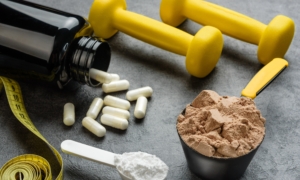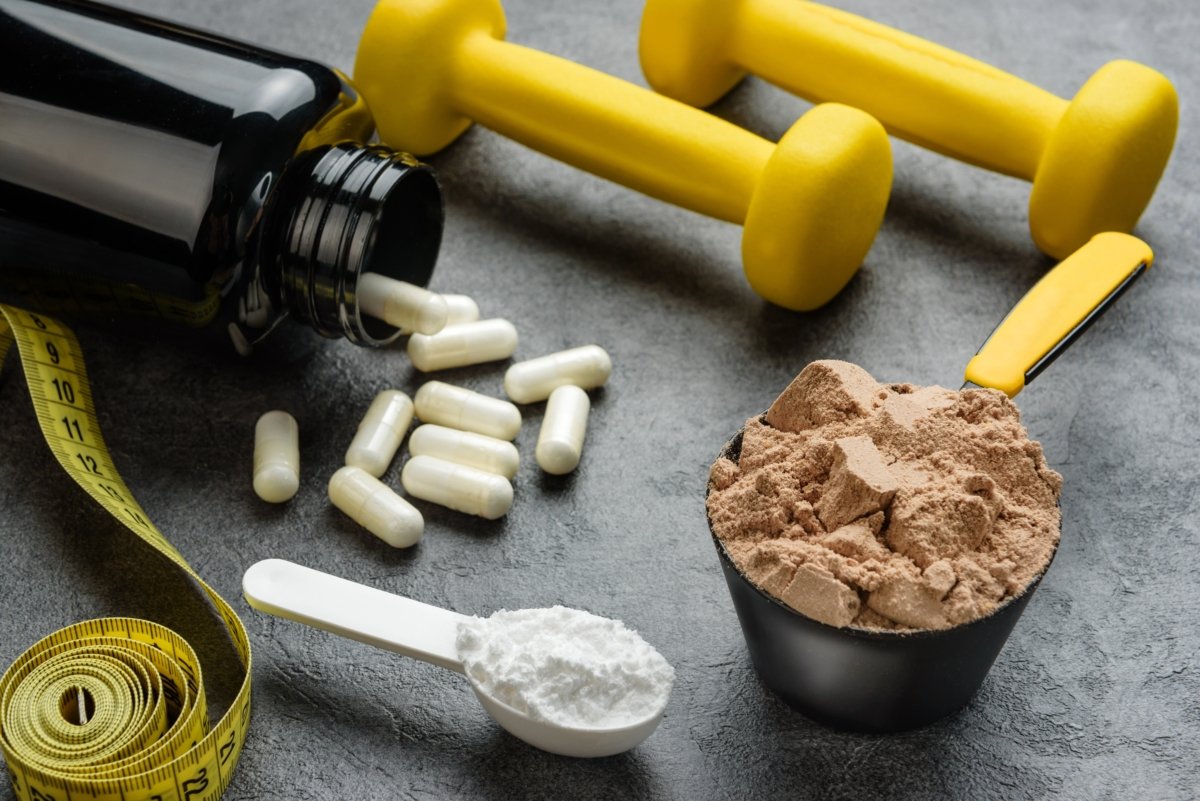9 Science-Backed Benefits of Creatine Beyond the Gym

In the bustling world of fitness, the cacophony of clanging weights often mingles with tales of the latest and greatest supplements—metabolic boosters, muscle builders, and fat burners.
Scan the room, and you’ll spot the gym bros, their arms clutching shaker bottles filled with a spectrum of rainbow-hued liquids. Creatine, a key component of these vibrantly colored brews, holds court as a favorite for those pursuing their next personal best.
Yet, the power of this naturally sourced supplement doesn’t stop at aiding those who are seeking sculpted biceps or chiseled abs. With roots in everyday proteins, creatine delivers a host of surprising health benefits that are gaining attention beyond the gym walls.
Nature’s Lesser-Known Power Player
Do you ever wonder how sprinters can maintain such high speed over short distances or how weightlifters can hoist hefty loads? That’s creatine at work.
During strenuous activities, our bodies rapidly convert creatine into creatine phosphate, which in turn produces adenosine triphosphate (ATP)—our bodies’ primary energy currency. When muscles contract, ATP is broken down to produce energy. The more ATP is available, the more energy can be utilized, enhancing performance and faster recovery.
This amplified energy production doesn’t just power our muscles—it optimizes mitochondrial function, too. In doing so, it could play a role in regulating inflammation and oxidative stress in the body, contributing to broader health benefits beyond physical strength and stamina.
Our bodies, with their remarkable biochemical adaptability, craft much of the creatine we need in-house. The liver, kidneys, and pancreas join efforts to transform three common amino acids—arginine, glycine, and methionine—into creatine. We can also get creatine from eating animal foods, or get the amino acids that build creatine from plant foods.
Creatine has a knack for finding its way to the parts of the body that hunger for energy the most. Through a sophisticated transportation system, it moves through the bloodstream and into high-energy-demand areas, particularly the brain and skeletal muscles. Research reveals that a whopping 95 percent of creatine sets up shop in the skeletal muscles.
Creatine: For More Than Muscles
Richard B. Kreider, a professor at Texas A&M University and a member of the scientific advisory board for Creatine for Health, is one of the foremost experts in creatine.
Kreider’s research points out that the benefits of creatine are far-reaching, spanning from pregnancy to the elderly.
“A lack of creatine in the diet of children and adolescents has been shown from NHANES data set to result in shorter kids with higher body fat and less muscle mass,” Kreider told The Epoch Times.
A burgeoning interest in creatine has spurred research into its more comprehensive health benefits—and people are taking note.
“Word is getting out. There has been a doubling in worldwide sales of creatine monohydrate (CrM), and back supply primarily from companies adding creatine to supplements focused on middle-aged and older individuals,” Kreider said.
According to MarketWatch, the global creatine market was valued at about $286 million in 2022 and is projected to nearly double to about $526 million by 2028.
9 Science-Backed Benefits of Creatine
Here are nine evidence-based potential benefits of creatine that substantiate its growing reputation.
Wards Off Depression
There’s emerging evidence that creatine may serve as a potent ally in the fight against depression. A 2020 study published in Nature’s Translational Psychiatry journal included 22,692 U.S. adults and found that those with the highest dietary creatine intake had nearly half the prevalence of depression compared to those with the lowest intake, particularly among women. By addressing disruptions in brain energy production and utilization associated with depression, this supplement shows promise as an antidepressant.
Combats Diabetes
Emerging research indicates that taking creatine supplements, especially with physical activity, might help improve blood sugar regulation. This potential benefit appears to be driven by creatine’s ability to boost insulin production, enhance the storage of energy in muscles, and decrease high blood sugar levels.
These early promising findings come mainly from several smaller studies. Yet, a more comprehensive review didn’t completely validate these findings. Therefore, a more thorough investigation is needed to confirm creatine’s impact on blood sugar management and its prospective use as a weapon against diabetes.
Protects and Improves Brain Health
Our brains expend significant energy for cognition, problem solving, and memory recall. Creatine is critical in providing this energy, aiding essential functions within our brain cells.
A meta-analysis published in Nutrition Reviews found that creatine supplementation can enhance memory performance in healthy people.
“Subgroup analysis showed the effects of creatine were more robust in older adults,” it concluded.
An animal study published in the Journal of Neurochemistry in 2009 found that “combination therapy using CoQ(10) and creatine may be useful in the treatment of neurodegenerative diseases such as Parkinson’s disease and [Huntington’s disease].”
A research review published in F1000 Research in 2014 looked at research into creatine supplementation for age-related disease and found that “creatine has the potential to elicit positive effects in muscle strength, memory, and has further influence on neurodegenerative conditions.”
The study noted that it remains to be seen if creatine can affect the intermediate or late stages of age-associated, progressive neurodegenerative disorders but that its energy metabolism and neuroprotective mechanisms make it an attractive target for future research.
While clinical trials have produced a medley of results, creatine’s robust neuroprotective properties, potent antioxidant prowess, and capability to spark energy metabolism highlight its potential as a supplement in the battle against these relentless diseases.
Provides a Boost of Energy
Creatine plays a pivotal role in the way our bodies generate energy. It does this by aiding in producing adenosine triphosphate (ATP), our primary cellular energy source. Thus, creatine supplementation can boost energy, whether for a high-intensity workout or to carry out our daily tasks, proving beneficial for athletes and anyone who needs a lift in their energy levels.
Improves Cardiovascular Health
Creatine is making waves in the realm of cardiovascular health. It’s been linked to healthier blood lipid management, driving down cholesterol and triglycerides in a bid to bolster heart health. It doesn’t stop there; animal studies found that creatine could prevent fatty liver disease in rats, further fueling metabolic well-being.
The unsung hero of creatine’s heart-friendly roster is its potential to curb homocysteine levels, a notorious heart disease risk factor. Coupled with its antioxidant shield that defends against cellular havoc, creatine emerges as a multifaceted champion for heart health and metabolic vigor. All these findings indicate the diverse roles of creatine in promoting a healthier heart.
Enhances Immunity
Creatine supplementation may play a pivotal role in bolstering the immune system. Particularly, it’s crucial for the optimal functioning of T lymphocytes—vital immune cells that are critical for the body’s response to viral infections. Under stressful scenarios, such as facing a viral load, insufficient creatine levels could compromise the immune response.
Creatine supplementation may also help combat post-viral fatigue, such as that experienced by many COVID-19 patients. A 2023 study suggests that creatine levels are reduced in those with long COVID, implying that creatine could be beneficial in facilitating a faster return to normal activity levels and aiding recovery from post-viral fatigue.
Creatine steps in to help with recovery after intense workouts by easing inflammation, a factor that could give a roundabout boost to immune health. So, beyond its famed act in enhancing athletic performance, creatine could potentially amplify our bodies’ built-in and responsive immune functions, fostering overall wellness.
A review published in Nutrients in 2021 cautions that creatine “has diverse effects on components of the innate and adaptive immune repertoire” and should therefore be taken with some caution and not be overused.
It also notes, however, that creatine’s effect on inflammation may be particularly helpful for some people.
“For example, if an individual has a condition exacerbated by proinflammatory mediators, then creatine administration should be considered as an adjuvant therapy since it appears to ameliorate proinflammatory processes characteristic of an M1[macrophage] phenotype, and all available data attest to its safety,” the journal noted.
Anti-Cancer
“T cells demand massive energy to combat cancer,” notes a study published in the Journal of Experimental Medicine in 2019. Creatine’s critical role as a source of cellular energy becomes important in this scenario, researchers found.
Researchers looked at mice that had a gene that limited creatine uptake and noted that “creatine uptake deficiency severely impaired antitumor T cell immunity.” Supplementing creatine in those mice “showed synergistic tumor suppression efficacy.”
“We further demonstrated that creatine acts as a ‘molecular battery’ conserving bioenergy to power T cell activities. Therefore, our results have identified creatine as an important metabolic regulator controlling antitumor T cell immunity, underscoring the potential of creatine supplementation to improve T cell-based cancer immunotherapies,” the study authors said.
Another study published in Nutrients in 2021 found that “creatine supplementation has been shown to enhance antitumor T cell immunity in multiple preclinical mouse tumor models and, importantly, to synergize with other cancer immunotherapy modalities.”
Promotes Bone Health
Evidence has suggested that creatine may help slow bone loss and potentially reduce osteoporosis risk. Some studies have reported that creatine can promote bone mineral density when used with resistance training. The proposed mechanism is that creatine improves the energy availability for bone-building cells, helping them to work more effectively.
Yet, it’s crucial to note that some studies question the significant benefits of creatine on bone health. While it’s plausible that creatine could minimize bone loss, more comprehensive research must conclusively establish its effectiveness in mitigating osteoporosis risk.
Helps Women Navigate Hormonal Changes
A 2021 research review in Nutrients that examined studies on the effects of creatine on women described findings that creatine supplementation might prove helpful for women’s health, particularly during crucial stages marked by hormonal changes such as menstruation, pregnancy, postpartum, and menopause.
“Creatine supplementation among pre-menopausal females appears to be effective for improving strength and exercise performance,” reported the authors. “Post-menopausal females may also experience benefits in skeletal muscle size and function when consuming high doses of creatine and favorable effects on bone when combined with resistance training.”
This is important, given that decreased estrogen levels can contribute to muscle and bone loss.
The review noted that preclinical and clinical evidence finds that creatine supplementation can improve mood and cognition, “possibly by restoring brain energy levels.”
Therefore, due to changes in creatine bioavailability related to hormonal changes, creatine supplementation can be beneficial during these life stages.
Choosing the Right Creatine
Navigating the plethora of creatine products available online can be overwhelming. Researchers found more than 175 creatine-marketed products in an Amazon search, suggesting that consumers may find that deciding which one to buy is challenging.
Krieder simplifies this dilemma, stating: “Creatine monohydrate is the only type of creatine extensively studied for efficacy and safety. Others are either less effective, not effective, or more expensive.”
His statement is grounded in robust research. A 2022 study affirmed that creatine monohydrate (CrM) is the most effective and safest creatine form available. The study underscored that most marketed creatine forms are less bioavailable, less effective, more expensive, or lack adequate research about their safety and efficacy. CrM is recommended by professional societies and organizations and is globally approved as a dietary ingredient or food additive.
Safety Profile of Creatine
The safety of creatine, particularly creatine monohydrate, is well-documented and corroborated by significant scientific research.
According to Kreider: “Creatine monohydrate’s safety is confirmed by hundreds of clinical trials and over three decades of usage. It has Generally Recognized As Safe (GRAS) status in the [United States], and no data suggests it’s harmful in healthy or diseased populations.” Instead, many studies vouch for its health benefits across different clinical or diseased groups.
The Mayo Clinic further supports the safety of creatine, indicating that when used orally at appropriate doses, it’s likely safe for up to five years. However, they advise consumers to choose products that adhere to recommended manufacturing practices and undergo third-party testing for assured quality.
Sparse evidence hints at a possible worsening of kidney dysfunction in those who are already grappling with kidney disorders due to creatine. Yet, for those sporting healthy kidneys, creatine seems to leave no mark. Nonetheless, for individuals with preexisting kidney issues, treading carefully with creatine becomes necessary.
Jose Antonio, a leading expert in health and human performance at Nova Southeastern University–Florida and the CEO and co-founder of the International Society of Sports Nutrition, affirms this perspective. Drawing from his extensive research and publications, he told The Epoch Times that “after hundreds of studies, there are zero harmful side effects.” He further encouraged the use of creatine, emphasizing its significant benefits for body composition and cognitive health.
“There is no reason why you—or anyone else—should not take it,” Antonio said. “The benefits are tremendous.”




